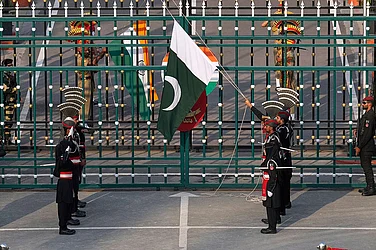I have heard this a thousand times: that the Rightwing parties (like BJP) are pro-reforms, and the Left isagainst them. Recent events seem to prove this assumption. Ever since the Congress-led UPA regime has come topower, the Left parties have ensured that the disinvestment ministry was scrapped, threatened to campaignagainst the proposed increase in FDI (foreign direct investment) caps in sectors like telecom and aviation,and opposed the decision to cut the interest rate on EPF (employees provident fund).
In comparison, the previous NDA government ran along the reforms path. It cut import duties beyond anyone'simagination just before the previous national elections, it privatised ports and airports and, mostimportantly, the pro-reforms torch-bearer, the former disinvestment minister, Arun Shourie, left no stonesunturned to sell off PSUs and raised an unbelievable Rs 16,000 crore in a single year (2003-04)!
There can be no debate on who's right, and who's not, as far as economic policies are concerned. Right?
Left. Sorry, wrong.
Surprised, shocked, numbed? Take a closer look.
You will find that the stance taken by both the BJP and the Left parties on important policy issues hasbeen the same. In fact, the decisions taken by the previous NDA mirror the demands made by the CPI and theCPI(M). Be it FDI, disinvestment, EPF rates or labour reforms, the two ideologies have converged - as if theiragendas have historically been the same.
I'll start with NDA's success story: PSU privatisation. Shourie emerged as the champion-reformer whofought, bickered, threw tantrums, blackmailed, even threatened (to resign) in a bid to push through the saleof government's stakes in PSUs. He achieved considerable success in the form of both strategic sales (to asingle private entity) and public ones (through the stockmarket route).
But in the last two years of NDA rule, Shourie couldn't effect a single strategic sale. Given theopposition within his party and from BJP's ideologue wings (like the Swadeshi Jagran Manch and the RSS), anddue to the Supreme Court order that virtually halted the sale of any PSU that had been set up under aParliamentary statute, our champion could only sell the government stakes through the stockmarket (and theinitial public offering) route.
All this after screaming from the rooftops that strategic sale was the only efficient, viable and effectivemanner to sell the state-owned companies! What he achieved in the last two years as the disinvestment ministerwas something that no expert will term as "privatisation" or "disinvestment".
Still, is that different from what the Left parties, as supporters of the UPA government, have agreed to?
Not at all. After repeatedly claiming that "we will not sell profitable PSUs" and scrapping thedisinvestment ministry, the UPA has decided to go ahead with public (or market) sales. Exactly on the lines ofwhat Shourie did with GAIL, ONGC and others. So, one can expect a few IPOs and public issues, the first beingthe NTPC one in the near future.
If this was not enough, Shourie showed a distinct anti-reforms streak on the issue of increasing theexisting FDI caps in telecom and aviation. The reformers' reformer, as part of the cabinet committee oneconomic affairs (CCEA), opposed the move on "security" grounds. Not once, not twice, but severaltimes. He was single-handedly responsible for the postponement of the decision during the NDA tenure.
So, what's wrong if the Left parties too are opposing the UPA's finance minister P. Chidambaram's decisionto increase the caps? And the reasons the Left is citing are the same as Shourie's. Well, the twain (left andright) do meet several times.
Let's get away from Shourie, and focus on what the NDA did on the critical issues like labour reforms. Remember that the BJP's leaders have constantly harped on second-generation reforms, of which labour was themost important. But during its entire six years, the NDA didn't move an inch. Labour reforms wereconsistently, and constantly, put on the back burner.
At least, the Left parties are consistent. They have always opposed labour reforms. They don't speak onelanguage publicly, and do something totally different in private. They don't mince words when talking aboutissues like disinvestment and labour reforms.
Before I am accused of being a Leftist, anti-reforms, and anti-BJP, let me give another example. For years,as interest rates in India have plunged, the NDA's finance and labour ministers maintained that it wasimperative to reduce the EPF rates. Not merely to keep the latter in tandem with general rates, but also toreduce the losses being incurred in the provident fund account, as it was investing in securities that yieldedlower interest than what it was paying the account holders.
For years, the NDA kept threatening to reduce the EPF rate, but didn't have the political will to do it.Obviously, the BJP-led government didn't wish to hurt the interests of its key vote bank, the BharatiyaMazdoor Sangh (BMS), a powerful trade union that owes allegiance to the Sangh parivar. Nor did it wish toruffle feathers among the vast section of blue-collar workers who may not be part of the BMS.
If there's nothing wrong with what the BJP (or NDA) was doing, then there's nothing wrong with the Leftopposing the EPF cut. After all, the workers class and the trade unions are among the key supporters of theLeft parties. And the CPI or the CPI(M) can't afford to lose their support.
It's true that the reasons for this convergence of ideologies are different and that the compulsions of theLeft are different from that of the Right. One is bogged down by intellectual history, the other by"nationalistic" mindset. One by proletariat politics, the other by swadeshi socialism. One by theangst of the powerless, the other by the desire to be a superpower. However, the end result is the same: endof economics.
















